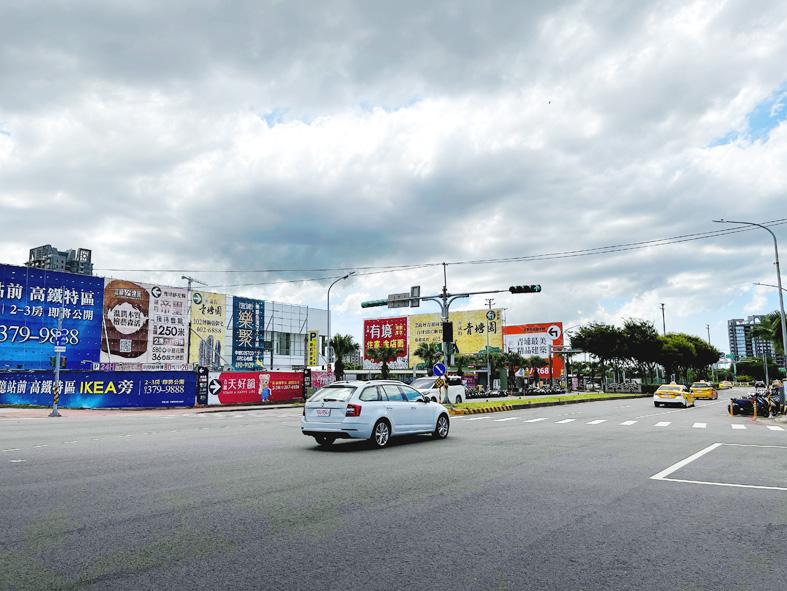A presale and new housing downturn in northern Taiwan is casting a long shadow as sales growth slows and supply mounts, the Chinese-language My Housing Monthly magazine said in a report yesterday.
Purchases of presale projects fell below NT$50 billion (US$1.68 billion) last month, although their number grew mildly from May, after the number of daily COVID-19 infections cases fell, the report said.
Fewer houses were completed last month, likely slowed by the virus outbreak, labor shortages and weakening sentiment, it said.

Photo: Hsu Yi-ping, Taipei Times
“People now assign more importance to rising inflationary pressures, interest rate hikes and negative wealth induced by the stock rout, now that concerns regarding the COVID-19 pandemic have subdued,” My Housing Monthly research manager Ho Shih-chang (何世昌) said in a statement.
“Rising supply and falling sales indicate selling pressures ahead when downside risks gain momentum,” he said.
Ho’s remarks came as the publication revealed its monthly climate monitor for the presale and new housing markets in northern Taiwan lost 2.1 points to 43.6 last month, the lowest this year.
While the sub-index on new presale projects edged up to 6.53 last month from 5.8 in May, reflecting improved confidence on the part of developers, the sub-index on sales dropped to 6.57 from 7.51, reflecting a downturn in purchasing interest, the magazine said.
Weekly transactions declined to two deals last month, from 2.5 deals in May, while reception sites served 25.5 teams of prospective buyers a week, compared with 25.6 teams one month earlier, it said.
The sub-index on price concessions widened slightly from 8.21 to 8.55, indicating that sellers were remaining firm about pricing, even though the macro-environment turned unfavorable, it said.
Spiking construction costs made developers unwilling to concede in the foreseeable future, Ho said.

UNCERTAINTY: Innolux activated a stringent supply chain management mechanism, as it did during the COVID-19 pandemic, to ensure optimal inventory levels for customers Flat-panel display makers AUO Corp (友達) and Innolux Corp (群創) yesterday said that about 12 to 20 percent of their display business is at risk of potential US tariffs and that they would relocate production or shipment destinations to mitigate the levies’ effects. US tariffs would have a direct impact of US$200 million on AUO’s revenue, company chairman Paul Peng (彭雙浪) told reporters on the sidelines of the Touch Taiwan trade show in Taipei yesterday. That would make up about 12 percent of the company’s overall revenue. To cope with the tariff uncertainty, AUO plans to allocate its production to manufacturing facilities in

TAKING STOCK: A Taiwanese cookware firm in Vietnam urged customers to assess inventory or place orders early so shipments can reach the US while tariffs are paused Taiwanese businesses in Vietnam are exploring alternatives after the White House imposed a 46 percent import duty on Vietnamese goods, following US President Donald Trump’s announcement of “reciprocal” tariffs on the US’ trading partners. Lo Shih-liang (羅世良), chairman of Brico Industry Co (裕茂工業), a Taiwanese company that manufactures cast iron cookware and stove components in Vietnam, said that more than 40 percent of his business was tied to the US market, describing the constant US policy shifts as an emotional roller coaster. “I work during the day and stay up all night watching the news. I’ve been following US news until 3am

COLLABORATION: Given Taiwan’s key position in global supply chains, the US firm is discussing strategies with local partners and clients to deal with global uncertainties Advanced Micro Devices Inc (AMD) yesterday said it is meeting with local ecosystem partners, including Taiwan Semiconductor Manufacturing Co (TSMC, 台積電), to discuss strategies, including long-term manufacturing, to navigate uncertainties such as US tariffs, as Taiwan occupies an important position in global supply chains. AMD chief executive officer Lisa Su (蘇姿丰) told reporters that Taiwan is an important part of the chip designer’s ecosystem and she is discussing with partners and customers in Taiwan to forge strong collaborations on different areas during this critical period. AMD has just become the first artificial-intelligence (AI) server chip customer of TSMC to utilize its advanced

Six years ago, LVMH’s billionaire CEO Bernard Arnault and US President Donald Trump cut the blue ribbon on a factory in rural Texas that would make designer handbags for Louis Vuitton, one of the world’s best-known luxury brands. However, since the high-profile opening, the factory has faced a host of problems limiting production, 11 former Louis Vuitton employees said. The site has consistently ranked among the worst-performing for Louis Vuitton globally, “significantly” underperforming other facilities, said three former Louis Vuitton workers and a senior industry source, who cited internal rankings shared with staff. The plant’s problems — which have not